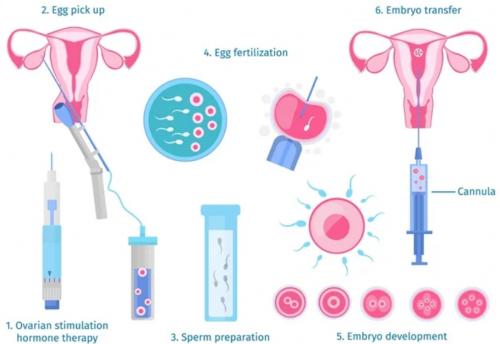After How Many Weeks of IVF Pregnancy Is Safe?

Many couples dream of having a kid, and thanks to modern treatment, even those facing obstacles can have hope. In vitro fertilization (IVF pregnancy) is an incredible medical innovation that allows individuals to have babies when they would otherwise struggle.
When trying to have a baby with IVF, timing is super important. You have waited long enough before starting fertility treatments to get pregnant, but now you don’t want to wait too long to be sure that this IVF pregnancy is going to be fine. You would be curious to know how many weeks of IVF treatment the pregnancy is considered safe.
If so, read this blog.
First few Weeks in IVF Treatment
During an IVF cycle, medications are used to regulate hormones in your body. But what is the purpose of these hormones? They help prepare the uterus lining for embryo transfer and implantation and support the early stages of pregnancy. Progesterone, a key hormone, is typically given for the first 8-10 weeks, counting from your last menstrual period.
The first trimester (the first 12 weeks) is critical in every pregnancy, whether IVF or natural. The baby's organs and systems are quickly growing. The embryo itself, the uterine lining, and the general environment inside the uterus all contribute to the increased chance of miscarriage during this period. The embryo implants must stimulate the development of the placenta (its hormonal and blood-supplying organ) well and support itself until delivery.
When is an IVF Pregnancy Considered Safe?
The good news is that around 10 weeks, the placenta, a unique organ that grows during pregnancy, begins releasing its hormones to support the baby. This implies your body will become less dependent on the additional supplements initially given. Furthermore, at this stage, the danger of miscarriage is considerably reduced.
So, around 10 weeks, your IVF pregnancy is normally as safe as a natural pregnancy. However, there are several other considerations to keep in mind.
Anomaly Scans: Level 1 and Level 2 Scans: These are done at the end of the 3rd and 5th month, respectively. They help to identify any abnormality in the developing baby, so as the baby grows, the uncertainty about its structural and genetic normalcy will be addressed by these scans, and this is true for both natural and IVF conception.
Monitoring for Growth and Complications: As with any pregnancy, you will need frequent checks to evaluate your baby's growth and development. Screenings will be performed to identify growth restrictions, positions, liquor and other potential issues.
Increased Vigilance: Because IVF pregnancies frequently occur in women with a history of infertility or loss at an advanced female age, doctors may be particularly cautious. This includes monitoring parameters such as:
● Twin Pregnancy: Since IVF might result in twins, doctors at the best IVF centre in Delhi will monitor their development closely.
● Preterm Labor: Being extra vigilant for signs of early delivery is important.
● Infections: Keeping proper hygiene and being aware of possible vaginal infections is critical.
Age-Related Conditions: As some women consider IVF pregnancies at a later age, regular check-ups for diabetes, hypertension, and hyperthyroidism are critical.
Stay Informed!
The safety of an IVF pregnancy varies with time. While the first few weeks require continuous monitoring and hormonal assistance, achieving the 8 to 10-week mark represents a significant safety milestone. However, constant monitoring and careful treatment are essential throughout the pregnancy process. Understanding the particular hurdles and staying informed can help you handle your IVF pregnancy with confidence and hope.
If you are considering IVF treatment, consult with Dr Rhythm Gupta. With her ample knowledge, she will guide you regarding the safety of the treatment.
Post Your Ad Here
Comments